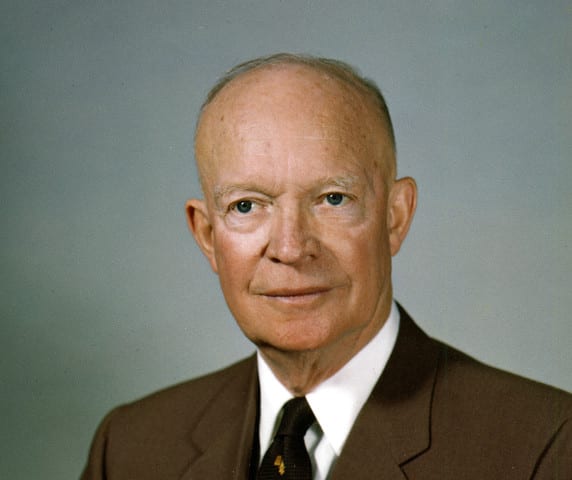Every tough political season we like to trot out the same references to the same people: Reagan, Kennedy, Lincoln, Roosevelt, Washington and Jefferson. This year is no different.
But if we look intently, we just might find the words of some quiet leaders. In times like these, we should recall those for whom leadership was a call to service and not a self-serving position to bellow boisterous, bogus bravado.
One man that is often overlooked is General and President Dwight Eisenhower. For 2020 there are three elemental Eisenhower lessons that we’d do well to recall.
Lesson 1: “Leadership is the art of getting someone else to do something you want done because he wants to do it.” ― Dwight D. Eisenhower
The quote above is instructive now, because our nation faces hard challenges requiring shared sacrifice.
Eisenhower sent countless men into battle. There is no more difficult leadership challenge than asking others to go to war. These men were ordinary Americans; husbands, fathers and sons who came from cities and small towns, leaving jobs in factories and farms because they were called.
These ordinary men did extraordinary things, serving and even dying with valor. It was a reflection of Eisenhower’s leadership.
Today we must ask Americans to love one another, to wear masks to protect one another, to reach out to the sick or to those who’ve lost family members or jobs or who face hate or discrimination. That requires leadership.
I’ve been fortunate to have met many successful leaders from politicians, to CEOs of multi-billion dollar corporations, to great coaches.
Every one of them led with that same idea that Eisenhower stated above. To truly lead one must point the way but also lead by example to inspire belief in and action for a cause. They all communicated honestly and with an honest accounting of what was needed from their teams.
Lesson 2: “You do not lead by hitting people over the head — that’s assault, not leadership.” ― Dwight D. Eisenhower
This directly contradicts the idea of coercive, dictatorial leadership. You can coerce people to do things by force of will, but ultimately that wears off. Coercion never builds the vital foundations of respect. Coercion breeds resentment and doubt and those explode into chaos in times of trouble.
Respect is what allows leadership to endure through tough times. And no one earns respect through orders and edicts issued on emotional whims. Respect is earned by genuine partnership between a leader and his team.
And ultimately attempted leadership without respect becomes the millstone that sinks those trying to lead by edicts and force alone.
Lesson #3: “Never let yourself be persuaded that any one Great Man, any one leader, is necessary to the salvation of America. When America consists of one leader and 158 million followers, it will no longer be America.” ― Dwight D. Eisenhower
This is particularly relevant in 2020. Today our president has stated many times that “I alone can fix this.” Our president wants to create a myth of forceful, unerring, individual leadership. Repeatedly his mythology of infallibility recasts every decision, rewrites all personal history as always being the perfect choice no matter how dire the consequences.
Our current president blames mistakes on others. And when cornered with undeniable facts and fault, he espouses conspiracy theories and blames the media.
Our current president uttered the words “I don’t take responsibility at all,” for the way the government he is tasked to lead has responded to the ongoing pandemic. He talks of today’s problems as though they are in some imaginary future that will only occur if you elect his opponent.
That stands in stark contrast to Eisenhower. He was a man who had written a speech in case the D-Day invasion at Normandy failed. In that message, he stood ready to take full responsibility with the weight of humanity’s future upon him.
“The troops, the air, and the Navy did all that bravery and devotion to duty could do. If any blame or fault attaches to the attempt it is mine alone,” Eisenhower wrote.
Policy and politics aside to discuss only the leadership element, we have a president who has failed to communicate what is required because it may be difficult at times. We have a president who fails to take responsibility and lacks honesty. We have a president who seems afraid to ask the American people to sacrifice for the common good.
Whether or not that is the type of leadership we want for America’s next four years is up to each individual voter. But it certainly helps to know where we have come from, and to learn the quiet lessons of leadership from towering examples from our past.



